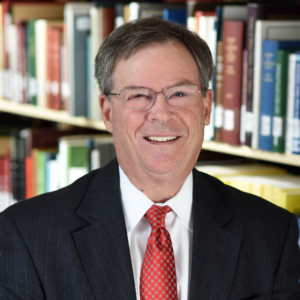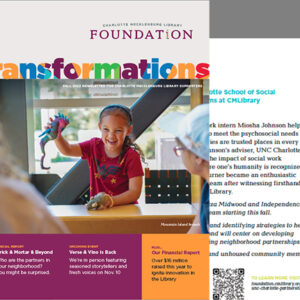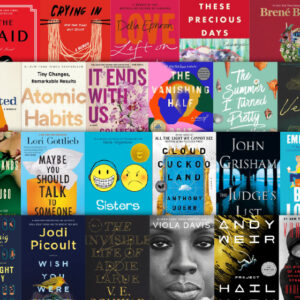LIBRARIES MATTER
A few years ago, I took my grandkids to ImaginOn: The Joe & Joan Martin Center, a Charlotte Mecklenburg Library facility for children and teens, and a partnership between the Library and Children’s Theatre of Charlotte. While they played, I wandered the library to browse and observe. A middle-aged man sitting at a table in the corner caught my eye. He faced the wall with a pile of children’s books. I watched as he took each book, read it closely, sometimes pointed to words, and then placed them in a second pile. I moved in closer to peek at the titles, and all were similar, something like: The United States, The U.S. Constitution, and The History of the United States. I guessed the man to be Latino and realized he was learning to read English and learning U.S. history as he devoured book after book. Two keys to learning language are to repeatedly see the same words used in different sentences and to read volumes at a time. This man was teaching himself both language and history at the library.
Most people associate libraries with books and reading. Indeed, the Charlotte Mecklenburg system not only boasts impressive paper and digital collections, their literacy programs for youth and adults are vast and high-impact. The ONE Access partnership with Charlotte-Mecklenburg Schools uses students’ school identification numbers as library account numbers, making the public library available to every child in CMS. The library provides teachers endless resources as well. The library offers summer reading programs and has an annual community book read, complete with book club discussion questions. And the library has been collaborating with Read Charlotte, an initiative to double the number of third graders reading on grade level by 2025, by providing workshops for families of young children on “active reading,” a foundational activity for making connections with books.
While books and libraries are synonymous, the Charlotte Mecklenburg Library is a platform for learning so much more than how to read. The library provides access to the internet through its free computer use, quiet study areas, collections of popular teen and young adult books, along with teen music and magazines. The library provides language-learning classes, citizenship classes, computer basics and more. College 101 is an annual series of free workshops designed to provide all the information someone needs about possibilities beyond high school. Our wonderful library has also partnered with the county chapter of the Autism Society of North Carolina to develop training videos for children and teens with special needs and their families.
Recently, Tom Hanchett joined the library team as its first Historian-in-Residence, providing community history presentations and workshops on history, food, local geography and more. The genealogy support at the Family Research Center is popular, as is the greatest collection of North Carolina music in the state. For those interested in writing and wanting a support group who provides feedback, our library has that, too! One of the most interesting opportunities I want to explore next is being part of a Learning Circle. People take an on-line class of their choice, and meet periodically to discuss what they are learning, enhancing the learning process maybe 10-fold through interaction with others. There is a 2020 Learning Circle planned for people who want to read and discuss Michelle Alexander’s new book, “The New Jim Crow.”
Susan Orlean, author of “The Library Book,” a beautiful history of a famous library fire and the many heroes who work in libraries, recollects her childhood visits to her local library with her mother: The place was so beautiful. I loved wandering around the bookshelves, scanning the spines until something happened to catch my eye. Those visits were dreamy, frictionless interludes that promised I would be richer than I arrived. It wasn’t like going to a store with my mom, which guaranteed a tug-of-war between what I wanted and what my mother was willing to buy me; in the library I could have anything I wanted.
Libraries still hold that promise and they are still emotionally warm, peaceful, cozy places to visit, one of the reasons I like to take my grandchildren. Just stepping into the library can be a treat. People welcome us with a nod or a look that invites us to ask questions. We browse and invariably stumble upon something unexpected, learning something we had not gone in to learn. Libraries are those special places you can go to get exactly what you need and come out with so much more.
Ellen McIntyre is the Dean of the Cato College of Education at UNC Charlotte. The college prepares teachers, counselors, principals, superintendents and educational researchers. McIntyre is a literacy specialist and is currently working to transform how teachers are prepared at UNC Charlotte. She serves as a trustee for the Charlotte Mecklenburg Library.
This article originally appeared in Charlotte Parent on September 12, 2019.



